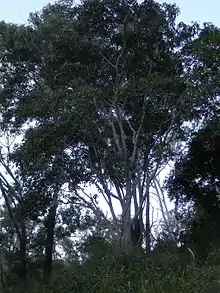Pleiogynium timoriense
Pleiogynium timoriense, commonly known as the Burdekin plum, is a medium-sized fruit-bearing tree native to Malesia, Australia and the Pacific Islands.[1]
| Pleiogynium timoriense | |
|---|---|
 | |
| Scientific classification | |
| Kingdom: | Plantae |
| Clade: | Tracheophytes |
| Clade: | Angiosperms |
| Clade: | Eudicots |
| Clade: | Rosids |
| Order: | Sapindales |
| Family: | Anacardiaceae |
| Genus: | Pleiogynium |
| Species: | P. timoriense |
| Binomial name | |
| Pleiogynium timoriense | |
| Synonyms | |
| |
Description
This semi-deciduous large tree can naturally reach up to 20 m high with a plank buttresses. but in cultivation generally grows to approximately 12 m. It has a dense canopy with glossy dark green leaves 4-10 x 2-6 cm and the trunk has rough dark bark. Leaflets commonly number 5 to 11, are arranged opposite, elliptic to ovate in shape, with a true terminal leaflet. The stalk of the terminal leaflet is significantly longer than those of the lateral leaflets. There are prominent domatia on the underside of leaflets.[2]
The tree has yellowish-green dioecious flowers which appear between January and March, and later (after pollination) grow into a fruit. The flower calyx lobes are about 0.6-1 mm long, with ovate petals about 1.7-3.8 mm long. Filaments are about 1.3-2.3 mm long.
The fruit is a depressed-obovoid drupe, about 20-25 x 20-38 mm. The fruit's flesh is generally plum-coloured (dark purple), however, white varieties have been reported. The fruit is edible when ripe.[3]
 fruits & seeds
fruits & seeds fruits
fruits Unripe fruits
Unripe fruits Leaves
Leaves Bark
Bark Tree
Tree
Fruit must be removed from tree to ripen for several days in a dark, damp place. Indigenous people are known to have buried the fruit underground to ripen. Fruit can be cooked, eaten raw or used in jellies, jams and preserves.[4][5][6]
Distribution
The species occurs in Indonesia, Malaysia, Papua New Guinea, the Philippines, Australia (south-eastern Queensland), the Cook Islands, Fiji, the Solomon Islands and Tonga[1] at elevations from sea level to 1000 meters. It grows in drier rain forest and monsoon forest.[3] In Queensland, the species occurs in dry rainforest, littoral and subcoastal riverine rainforest north from around Gympie.[2]
References
- "Pleiogynium timoriense". Germplasm Resources Information Network (GRIN). Agricultural Research Service (ARS), United States Department of Agriculture (USDA). Retrieved 24 July 2013.
- Williams, J.B.; Harden, G.J.; McDonald, W.J.F. (1984). Trees & Shrubs in Rainforests of New South Wales & Southern Queensland (First ed.). Australia: Botany Department, University of New England. p. 141. ISBN 0-85834-555-2.
- "Factsheet - Pleiogynium timorense". TRIN Interactive Key Services. Retrieved 7 May 2019.
- Pleiogynium timorense
- "Burdekin Plum". Bush Tucker. SGAP(Qld).
- Pleiogynium timorense
Further reading
- Netzel, Michael; Netzel, Gabriele; Tian, Qingguo; Schwartz, Steven; Konczak, Izabela (22 November 2006). "Sources of Antioxidant Activity in Australian Native Fruits. Identification and Quantification of Anthocyanins". Journal of Agricultural and Food Chemistry. 56 (26): 9820–6. doi:10.1021/jf0622735. PMID 17177507.
External links
- "Pleiogynium timoriense (DC.) Leenh". Atlas of Living Australia.
 Media related to Pleiogynium timoriense at Wikimedia Commons
Media related to Pleiogynium timoriense at Wikimedia Commons Data related to Pleiogynium timoriense at Wikispecies
Data related to Pleiogynium timoriense at Wikispecies